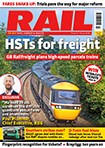As Wolmar remarks in his column (pages 38-39) the Transport Select Committee published its report on rail franchising on Sunday February 5, thus securing plenty of TV news coverage. Thus, I found myself doing live TV interviews by Skype at brunch time for Sky News and the BBC News Channel. It won’t surprise regular readers that my good friend Wolmar finds much in the report to reinforce his well-known dislike of franchising! He argues his case well and so once again I’m pleased that RAIL provides a full spectrum of opinions, because - as usual - I disagree with Christian!
First thing to note is the disconnect between what the report says and the tone and thrust of its accompanying press release. Hence, most news media focused on “serious shortcomings” on a model which “fails to deliver for passengers” and is unlikely to be “sustainable in the long term” because it is “no longer fit for purpose”.
Thus, viewers and readers did not learn the TSC’s view (page one, first paragraph!) that “franchising has facilitated passenger growth and service improvements” even though “it is clear that it has not yielded all the competitive benefits.” (So, it has delivered some, then!) Or that “franchising has certainly played a key role” in rail’s 3.3% growth in modal share of all transport since 1997-98 with numbers doubled.
Let’s be clear: notwithstanding persistent ideological opposition to franchising, it is not broken and has been fundamental to passenger benefits - as the TSC acknowledges. But it most certainly does have major problems, too, and it is those that I want to talk about.
In RAIL 819, I explained why I think we’ve seen declining interest in bidding by UK owning groups in favour of overseas railways from Europe and Japan. Let’s drill down further - firstly by ‘simplifying and exaggerating’ what’s happened in 20 years of privatisation.
For the first five years, we saw simple franchises, lots of entrepreneurial swashbuckling and the start of real innovation. For example, Midland Main Line, first under Richard Brown and then Nick Brown, introduced the Foursight ticket, with TV advertising, for four people from the East Midlands to London for £30. This was the first time rail had faced up commercially to the fact that families measure cost against the price of a tank of petrol.
Sadly, there were abuses, too, which led firstly the Strategic Rail Authority (under Richard Bowker) and later the DfT to tighten franchise terms and increase costs until margins fell from about 5% to about 2% and, bluntly, there were less complex and less risky options elsewhere to earn a return. Thus National Express, once holder of nine franchises, has quit UK rail. This leaves franchising largely in the hands of overseas railways who live easily with bureacracy and who have access to finance cheaper than anyone else. They are happy with 2% margins.
So let’s just fix the problems, which as I see it are largely of the DfT’s own making.
Longer franchises: Yes, there are problems around interfaces, managing risk and ensuring taxpayer value. But then there’s Chiltern, with its unique 20-year franchise. The Evergreen upgrades were difficult and too expensive - but they happened and we saw a moribund, run-down and fast-declining shadow of a main line transformed. As the Competition & Markets Authority rightly concluded: “Where franchise specification is less tight, franchisees delivered improvements to rolling stock, line speed and service in order to compete with other franchises”. GNER, until derailed by its parent Sea Contaimers’ US bankruptcy, likewise showed how well it could be done.
Bidding costs are now said to have risen from £5 million to £8m or even £10m. This is unsustainable - especially when seven franchises are due for renewal by 2019 and a worthwhile competition to drive innovative proposals requires more than two bidders. Bidding costs could be cut: modelling timetables with NR is both costly and complex, for example. TfL does not require this with its concessions, so there is scope for cutting costs.
Franchise planning bakes in problems for operator and NR. Where franchises overlap, unco-ordinated train services create congestion and unworkable timetables in which both NR and TOC are then penalised for poor performance. This is a major issue within the large Thameslink Southern Great Northern franchise. Moreover, TOCs are paid through the Rail Settlement Plan, based on the proportion of services run, so there is a financial disincentive to thin out the timetable. Also, the TSGN all-day service first makes recovery from morning peak problems impossible in time for a good evening peak, which is then followed by thousands of miles of empty stock movements to get trains to depots. Franchising is not a bad idea, but it often is badly framed and implemented. Fix the problem.
Franchises are not aligned with NR processes and routines. For example, TfL requires its operators to claw back access charges even for routine maintenance closures, so the TOC is incentivised to challenge NR requirements for access closures. This does not happen with DfT franchises, so TOCs are indifferent to this problem, which also drives up NR costs. Alignment of TOC and NR’s incentives could have a profound effect.
Fixing this requires greater expertise and capacity at the DfT. Certainly since 2012, and despite the insistence that passengers come first, bids have been decided on cost. This means that the only way to win a bid is to submit one that is barely deliverable and vulnerable to economic knocks. Further, under the catch-all of ‘commercial confidentiality’ there’s no transparency after a bid is won as to exactly what its terms are. A weighted index could convey this information while not revealing genuinely sensitive information.
Is it right that the DfT, a key commercial partner in all franchises, is also their monitor and enforcer? Transfer of these roles to ORR would resolve this, with the wider benefit of greater honesty and transparency. Under the current arrangements, TOCs and owners are very reluctant to criticise the DfT for fear of ‘biting the hand that feeds’. This further frustrates transparency and prevents reform.
Finally, franchising has made it possible for the operating railway to cover all its costs and pay for itself on a day-to-day basis for the first time in history. And yet it is judged “not fit for purpose.”! In 2011-12 TOCs made a net contribution of £400m to Government for running trains. By 2015-16, this more than doubled to £877m - hardly a failure. Whole industry costs are high at £4.8bn, but even the TSC concedes “The vast bulk of this subsidy is for infrastructure investment and maintenance” - in other words, NR, the only nationalised component of the railway. Calm heads are needed.
Comment: RAIL 820: February 15 2017 - February 28 2017













Comment as guest
Comments
No comments have been made yet.